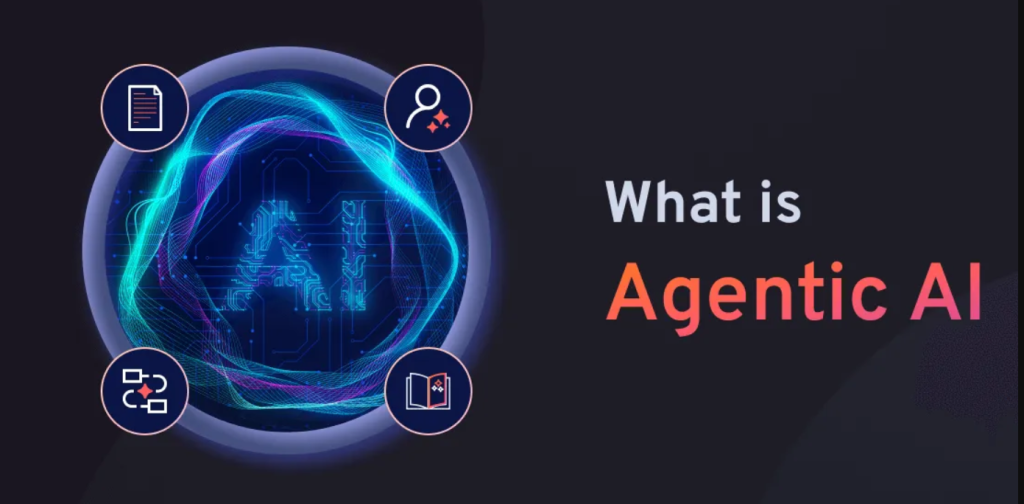
The convergence of agentic artificial intelligence (AI) and quantum computing is poised to redefine the landscape of autonomous systems. This powerful combination promises to unlock new levels of autonomy, adaptability, and computational capability-enabling intelligent agents to operate in complex, dynamic environments with unprecedented efficiency and sophistication.
What Is Agentic AI?
Agentic AI refers to AI systems designed with the capacity to act autonomously, adapt in real time, and solve multi-step problems based on context and objectives. Unlike traditional AI, which typically follows predefined rules or requires frequent human oversight, agentic AI systems can:
- Perceive their environment and gather data.
- Reason about complex scenarios and set goals.
- Act independently to achieve those goals.
- Learn from outcomes and continuously improve their performance.
Agentic AI is built from multiple specialized AI agents, each capable of handling specific tasks. These agents are orchestrated to collaborate, plan, and execute strategies in pursuit of overarching objectives. This model enables agentic AI to tackle challenges ranging from real-time decision-making in autonomous vehicles to dynamic supply chain optimization and personalized healthcare recommendations.
The Quantum Leap: Why Quantum Computing Matters
Quantum computing harnesses the principles of quantum mechanics-such as superposition and entanglement-to process information in fundamentally new ways. Unlike classical computers, which use bits (0 or 1), quantum computers use qubits that can represent multiple states simultaneously. This allows them to:
- Solve complex optimization problems exponentially faster.
- Simulate intricate systems (e.g., molecular interactions, financial markets) that are infeasible for classical machines.
- Analyze vast datasets and run highly parallel computations.
For agentic AI, quantum computing is not just an incremental upgrade-it is a paradigm shift. As agentic AI systems become more complex and interact with more agents and variables, the computational demands grow exponentially. Quantum computing provides the raw power needed to simulate, plan, and make decisions in these vast possibility spaces.
How Quantum Computing Empowers Agentic AI

1. Enhanced Problem-Solving and Planning
Quantum-powered agentic AI can evaluate millions of scenarios in parallel, enabling rapid and robust decision-making. For example, in logistics, a quantum AI agent can instantly optimize routes and schedules across a global supply chain, accounting for real-time disruptions and constraints.
2. Accelerated Learning and Adaptation
Agentic AI systems learn from experience. Quantum computing accelerates this learning by allowing agents to process and analyze much larger datasets, simulate outcomes, and refine their strategies faster than ever before.
3. Advanced Simulation and Modeling
Quantum computers excel at simulating complex systems. Agentic AI can leverage this capability to model everything from molecular structures in drug discovery to urban traffic patterns, enabling more accurate predictions and innovative solutions.
4. Real-Time Autonomy in Dynamic Environments
In autonomous vehicles, quantum-enhanced agentic AI can process sensor data, anticipate obstacles, and make split-second decisions with greater precision. Quantum sensors further boost perception, navigation, and reliability, making autonomous systems safer and more adaptable.
5. Cross-Domain Intelligence
Agentic AI systems can transfer knowledge across domains. Quantum computing enables agents to generalize insights from one area (e.g., predictive maintenance in manufacturing) and apply them to another (e.g., asset management in finance), driving operational efficiency across sectors.
Real-World Applications
| Sector | Agentic AI + Quantum Computing Use Case |
|---|---|
| Healthcare | Autonomous diagnosis, personalized treatment, rapid drug discovery |
| Finance | Real-time trading, portfolio optimization, risk assessment |
| Logistics | Global supply chain optimization, adaptive routing |
| Smart Cities | Dynamic traffic management, energy optimization |
| Autonomous Vehicles | Enhanced perception, navigation, and decision-making |
| Cybersecurity | Quantum-safe encryption, threat detection |
| Scientific Research | Accelerated simulation and discovery |
Challenges and Considerations
- Technical Hurdles: Quantum computing is still an emerging technology, facing issues of scalability, error correction, and integration with classical systems.
- Computational Complexity: Training agentic AI for quantum systems requires significant resources and interdisciplinary expertise.
- Ethical and Security Risks: The power of autonomous, quantum-enhanced agents raises questions about privacy, security, and unintended consequences.
- Data Scarcity: Quantum systems generate limited data, posing challenges for AI training4.
The Future: Toward Fully Autonomous Quantum Agents
The fusion of agentic AI and quantum computing is paving the way for autonomous systems that can:
- Discover new scientific principles independently.
- Optimize global systems in real time.
- Collaborate across digital and physical domains.
- Democratize access to advanced technologies through user-friendly interfaces.
As these technologies mature, we can expect agentic AI powered by quantum computing to become the backbone of next-generation digital infrastructure-transforming industries, accelerating innovation, and addressing some of humanity’s most complex challenges.
In-depth Example:
Biogen, a leading biopharmaceutical company, partnered with Cotocus to leverage quantum computing for accelerating drug discovery and improving patient outcomes. By simulating molecular interactions at the quantum level, Biogen reduced R&D timelines and improved the accuracy of drug candidate selection-demonstrating the transformative impact of quantum-powered agentic AI in healthcare.
Expert Opinions & Interviews
Dr. Guido Burkard, Professor of Theoretical Physics, University of Konstanz:
Quantum computing is not just about faster calculations; it’s about exploring new frontiers in information processing. The integration of AI agents with quantum systems could lead to breakthroughs in fields ranging from cryptography to material science.
Gev Balyan, AI Expert:
While classical AI currently outperforms quantum computing in many practical tasks, quantum’s unique ability to simulate complex, strongly correlated systems will eventually make it indispensable for next-generation AI applications. A hybrid approach, blending classical and quantum methods, is the likely path forward.
Enrique Solano, Kipu Quantum:
Agentic Quantum Computing is the smartest entanglement of AI and QC. It’s about using quantum advantage for real-world industry applications, from optimization to machine learning, and making quantum solutions accessible through cloud platforms.
Personal Reflections & Experience
Over the past two years, writing about emerging technologies has taught me the value of making complex topics accessible. I’ve found that using analogies, real-world examples, and expert insights helps demystify quantum computing and agentic AI for broader audiences. Engaging with industry professionals and following real-world case studies has deepened my understanding and enriched my content, ensuring it remains both informative and actionable.
FAQs: Agentic AI & Quantum Computing
Q1: What is agentic AI, and how is it different from traditional AI?
Agentic AI refers to systems that can autonomously set goals, make decisions, and adapt their actions-unlike traditional AI, which typically follows fixed rules or requires human input.
Q2: How does quantum computing enhance agentic AI?
Quantum computing enables agentic AI to process vast datasets, optimize complex decisions, and simulate scenarios at speeds unattainable by classical computers.
Q3: Which industries are benefiting from agentic AI and quantum computing?
Industries such as pharmaceuticals, chemicals, automotive, finance, logistics, and energy are already seeing real-world benefits, from drug discovery to supply chain optimization.
Q4: What are the main challenges in integrating AI with quantum computing?
Key challenges include the current immaturity of quantum hardware, the need for interdisciplinary expertise, data scarcity, and ethical considerations around autonomy and security.
Q5: Will quantum computing replace classical AI?
Not in the near term. Experts suggest a hybrid approach-leveraging the strengths of both classical and quantum systems-will be most effective for complex, real-world applications
In summary:
Agentic AI, when supercharged by quantum computing, represents a leap toward truly autonomous, intelligent systems. By combining self-directed reasoning with quantum-powered computation, these systems are set to redefine what’s possible in automation, decision-making, and problem-solving across every sector of society.